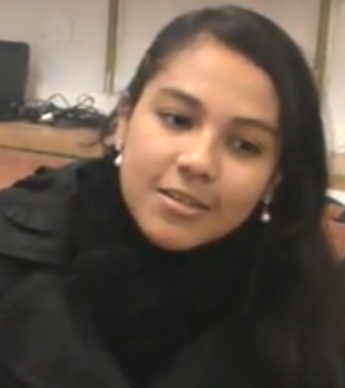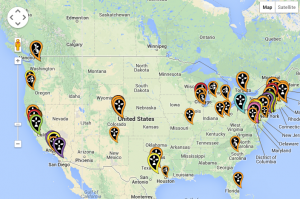Holidays Subscribe
A selection of initiatives, blogs, resources and communities on Jewcology which focus on Jewish holidays.
From the Blogs
Eden Village is hiring farm educator apprentices for 2015 growing season!
Eden Village Camp is Hiring! Submit Your Application About Eden Village Camp: Eden Village Camp aims to be a living model of a thriving, sustainable Jewish community, grounded in social responsibility and inspired Jewish spiritual life. By bringing the wisdom of our tradition to the environmental, social, and personal issues important to today’s young people, we practice a Judaism that is substantive and relevant. Through our Jewish environmental and service-learning curricula, joyful Shabbat observance, pluralistic Jewish expression, and inspiring, diverse staff ...
R&R Shabbat at the JCC
R & R: Shabbat at The JCC is an antidote to our 24/7 lifestyle. Make your Shabbat afternoon special and share in our community with workshops in art, yoga, meditation, food, music, study sessions, film, performances, creative art projects, spa experiences, and indoor and outdoor play. Enjoy programs for both children and adults. R&R is an amazing weekly opportunity to be together as a family and as a community; it’s an incredible alternative to the typical New York Saturday and it is our gift to you. Join us for programs that respect all levels of observance. ...
#Yemima, Rachel Imeinu and the Merit of Righteous Women
"When Moshiach [the Messiah] comes, I will be the first to rise up and be in the Holy Temple."
Make Your Thanksgiving Celebration Eco-Friendly
Thanksgiving, while an ecumenical holiday, is a great time to consider the Jewish principle of baal tashchit (do not waste). There are many things you can do to make your celebration of this holiday more earth friendly. Reduce, reuse and recycle as much as possible: Try to buy only as much food as you need and look for food that either has no container or that has a container that can be recycled. Plan to compost any non-meat food items that can't be eaten (such as carrot peel) or that have to be thrown out after the meal. Also plan to use reusable cloth napkins ...
Earth Etude for Elul 3 – Let it Rest
Earth Etude for Elul 3 - Let It Rest by Carol Reiman Let it rest-- the land that we have worked so hard, the grassy fare for geese now taken by the high tech labs, the water diverted far away to leave the old spot bare, the day diminished by our dense cramming, electronics robbing our eyes of moisture... Let it rest-- the fish sleep still near the bottom, the standing horse relaxes muscles, the cat stretches and curls... Let it rest-- the yawn exchanges stale air for fresh, cells grow, the blood flows with its passengers for new destinations, ...
Spread over all of us the Sukkah of shalom, salaam, paz, peace!
Can our Sukkot become not only symbols but peacemaking sanctuaries for both "adam" and "adamah"? As we enter the Shmita / Sabbatical Year, we may be asking what its content might be. We can begin, just a few days before Rosh Hashanah, joining the several dozen Jewish organizations that will take part in the People’s Climate March in New York City, Sunday Septembr 21, beginning at 11:30 am. Then on Rosh Hashanah (which can mean “New Year” or “Start of Transformation”), we might celebrate what the tradition sees ...
Tisha B’Av and Vegetarianism
Jews can enhance their commemoration of the solemn but spiritually meaningful holiday of Tisha B'Av by making it a time to begin striving even harder to live up to Judaism's highest moral values and teachings. One important way to do this is by moving toward a vegetarian diet. Please consider: 1. Tisha B'Av (the 9th day of the month of Av) commemorates the destruction of the first and second Temples in Jerusalem. Today the entire world is threatened by destruction by a variety of environmental threats, and modern intensive livestock agriculture is a ...
Are There Special Foods to Welcome Shmita?
Rabbi Nina Beth Cardin has suggested that for the Erev Rosh Hashanah meal which this year, on Wednesday evening September 24, begins the Shmita Year of Shabbat Shabbaton, we have a seder plate, with seven items (marking the seven-ness of Shmita). What might these seven be? Already nominated: bread (like challah for Shabbat, should this be a “woven” bread? round, for the cycles, as is a traditional Rosh Hashanah challah? how about woven into seven spirals?), an apple, honey, wine, pomegranates. What might the others be, and ...
Can we see all Earth as our Holy Temple of today?
There are two crises in the world today that call especially for Jewish responses: One because it involves the future of a state that calls itself “Jewish,” and of its supporters in America -- their spiritual, intellectual, ethical, and physical futures – at a moment when the relationship between Jews and our Abrahamic cousins of Palestine is filled with violence that threatens to kill more people, breed more hatred, and poison the bloodstream of Judaism and Jewish culture; The other because it calls on Judaism as –- probably uniquely ...
Yovel: Divine Sparks in New York
By Yael Schonzeit "One generation goes, another comes," reads Kohelet (Ecclesiastes), "but the Earth remains the same forever." The sun will rise, the wind will blow and the rivers will continue to flow into the sea, uncontrollable no matter what we do. As the most recent natural phenomenon of Sandy has shown us, nature is so much larger than us. The Earth is unpredictable and holds endless power and strength. We as humans tend to forget that we are partners with God in creation. Part of our role is to maintain the planet's homeostasis, to ...
The Seder’s Innermost Secret — Charoset: Earth & Eros in the Passover Celebration
There it sits on the Seder plate: charoset, a delicious paste of chopped nuts, chopped fruits, spices, and wine. So the question would seem obvious: "Why is there charoset on the Seder plate?" That's the most secret Question at the Seder – so secret nobody even asks it. And it’s got the most secret answer: none. The Haggadah explains about matzah, the bread so dry it blocks your insides for a week. The Haggadah explains about the horse-radish so bitter it blows the lid off your lungs and makes breathing so painful you wish ...
Freeing Ourselves at Passover From Diets That Harm Us and Our Planet
Some Jews commendably go to extraordinary lengths before and during Passover to avoid certain foods, in keeping with Torah mitzvot. But at the same time, many continue eating other foods that, by Torah standards, are hardly ideal. On Passover, Jews are prohibited from eating, owning, or otherwise benefiting from chometz, foods such as breads, cakes, and cereals, that are made from one of the five grains (wheat, barley, rye, spelt, and oats) that ferment from contact with liquid. These prohibitions are based on several Torah verses and are observed with great care by ...
Purim and Vegetarianism
There are many connections between vegetarianism and the Jewish festival of Purim: 1. According to the Talmud, Queen Esther, the heroine of the Purim story, was a vegetarian while she lived in the palace of King Achashverus. She was thus able to avoid violating the kosher dietary laws while keeping her Jewish identity secret. 2. During Purim it is a mitzvah to give "mat'not evyonim" (added charity to poor and hungry people). In contrast to these acts of sharing and compassion, animal-based diets involve the feeding of over 70 percent of the grain in the United States ...
Uplifting People and Planet
Exciting news! Just in time for Tu b’Shevat, Canfei Nesharim and Jewcology are proud to announce the launch of a new ebook exploring traditional Jewish teachings on the environment, Uplifting People and Planet: Eighteen Essential Jewish Lessons on the Environment, edited by Rabbi Yonatan Neril and Evonne Marzouk. This ebook is the most comprehensive study in English of how Jewish traditional sources teach us to protect our natural resources and preserve the environment. From food to trees, energy to water, wealth to biodiversity, the book studies eighteen ...
A Tu B’Shvat Seder to Heal the Wounded Earth
The New Year – for Rebirthing Trees: [This version of the Haggadah for Tu B’Shvat has been greatly adapted by Rabbi Arthur Waskow of The Shalom Center from a Haggadah shaped by Ellen Bernstein, as published in Trees, Earth, and Torah: A Tu B’Shvat Anthology (Jewish Publ. Soc., 1999, ed. by Elon, Hyman, & Waskow). Bernstein wrote introductory remarks to sections of that Haggadah, many of which have been included or adapted for this one. They are indicated in the text by the initials “EB.” * The desire for such a Haggadah grew from ...
Lessons From Trees: a Tu Bishvat Message
Some of my most important lessons in life I learned from Jewish verses about trees. From the following I learned that I should be an environmental activist, working to help preserve the world: In the hour when the Holy one, blessed be He, created the first person, He showed him the trees in the Garden of Eden, and said to him: "See My works, how fine they are; Now all that I have created, I created for your benefit. Think upon this and do not corrupt and destroy My world, For if you destroy it, there is no one to restore it after you." (Ecclesiastes Rabbah 7:28) From ...
For Tu Bishvat: Quotations from Jewish Sources about Trees
Since Tu Bishvat is considered the "birthday for trees," a time when trees are to be judged regarding their fate for the coming year, I hope the following Jewish quotations about trees and fruits will be helpful for celebrations of this increasingly popular holiday. 1. And God said: "Behold, I have given you every herb yielding seed which is upon the face of all the earth, and every tree that has seed-yielding fruit -- to you it shall be for food." (Genesis 1:29) 2. In the hour when the Holy one, blessed be He, created the first person, He showed him the trees in the ...
WHY IS THIS NIGHT DIFFERENT? THOUGHTS ON TU BISHVAT
One of the highlights of the Passover Seder is the recitation of the four questions that consider how the night of Passover differs from all the other nights of the year. Many questions are also appropriate for Tu Bishvat, which starts on Wednesday evening, January 15 in 2014, because of the many ways that this holiday differs from Passover and all other days of the year. While four cups of red wine (or grape juice) are drunk at the Passover Seder, the four cups drunk at the Tu Bishvat Seder vary in color from white to pink to ruby to red. While Passover is a holiday ...
Thanksgivukah: Giving Thanks for Miracles
Dan Brook & Richard H. Schwartz For the first time since 1888 and then not again for about 78,000 years (!), Chanukah and American Thanksgiving coincide this year on Thursday, November 28. Some are calling it Thanksgivukah. Some are calling it another miracle! It’s a once-in-a-lifetime opportunity. Hope springs eternal. Indeed, it's always been an integral part of Jewish and American history, spirituality, and politics. Without hope, there wouldn’t be a Chanukah; without hope, there might not even be a Jewish community; without hope, there ...
Chanukah and Vegetarianism
Jews can enhance their celebrations of the beautiful and spiritually meaningful holiday of Chanukah by making it a time to begin striving even harder to live up to Judaism's highest moral values and teachings by moving toward a vegetarian diet. Here are eight reasons, one for each night of Chanukah: 1. Chanukah represents the triumph of non-conformity. The Maccabees stuck to their inner beliefs, rather than conforming to external pressure. They were willing to say: This I believe, this I stand for, this I am willing to struggle for. Today, vegetarians represent non-conf...







